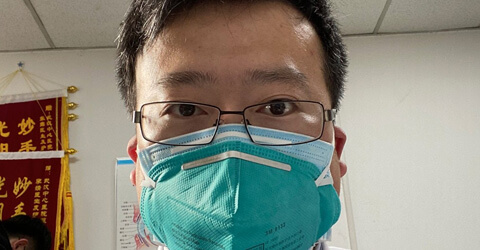Li Wenliang was a Chinese ophthalmologist who rose to fame for sounding the alarm on the early COVID-19 cases that emerged in Wuhan, China. He was the man attributed to bringing the virus to the world stage to better prepare and control the spread of the pandemic.
The Coronavirus pandemic has touched all our lives and forced us to live behind masks and closed doors, aloof from our friends and families. However, this has led to the rise of several covid warriors in various fields, be it our nurses and doctors fighting at the forefront of the battle or the people gathering and distributing food for the poor. One of the ultimate Covid warriors was Dr Li Wenliang, who unfortunately did not make it out alive. But we shall continue paying our tribute to this great hero who sounded the alarm on this fatal disease.
So who was Dr Li Wenliang?
Dr Wenliang started by studying clinical medicine at Wuhan University. He then went on to work in Xiamen, a port city in China. He took a position as an ophthalmologist at Wuhan Central Hospital in 2014. That hospital has been one of the health facilities at the epicentre of the outbreak of COVID-19.
Dr Wenliang raised the alarm after he saw seven patients with SARS-like symptoms. He wrote a post to a closed group of medical school classmates on the WeChat social media app. In the post called “Seven cases of a severe acute respiratory syndrome (Sars) from the Huanan Seafood Wholesale Market”, he warned about an outbreak of undiagnosed pneumonia at his hospital. In the message, he also asked them not to spread the message but “remind your family members and loved ones to be on the alert”.
He told The New York Times that there was already speculation within the group that there could be a new SARS outbreak and “we needed to be ready for it mentally. Take protective measures.”
Tom Inglesby, the Director of the Center for Health Security at Johns Hopkins Bloomberg School of Public Health in Baltimore, MD, USA,
“One of the world’s most important warning systems for a deadly new outbreak is a doctor’s or nurse’s recognition that some new disease is emerging and then sounding the alarm”. “It takes intelligence and courage to step up and say something like that, even in the best of circumstances.”
On 31st December, a screenshot of his post was leaked and circulated online. The next day, the local health authority made an official announcement saying that 27 cases of viral pneumonia of unknown cause had been detected. On 1st January, Wuhan police said they were punishing eight people for “spreading rumours” among which Li Wenliang was included.
Four days later he was summoned to the Public Security Bureau where Dr Wenliang was told to sign a letter. In the letter, he was accused of “making false comments” that had “severely disturbed the social order”. “We solemnly warn you: If you keep being stubborn, with such impertinence, and continue this illegal activity, you will be brought to justice – is that understood?” Underneath in Dr Li’s handwriting is written: “Yes, I do.”
Beijing-based news service Caixin reported on 1st February that he was initially distraught that his post was leaked and he was worried about being punished. But he said he later came to understand it reached a broader audience because of concerns about public health safety.
The directive then changed as Zeng Guang, chief epidemiologist at the Chinese Centre for Disease Control and Prevention, made a national television statement on 29th January that the eight people punished by the police should be held in “high regard”. In the meantime, local authorities had apologised to him, yet it was a moment too late.
Just a week after visiting the police, Dr Wenliang was treating a woman with glaucoma on 8th January. The patient’s body temperature was normal, and she did not show any symptoms. She later developed a fever the next day, and a CAT scan showed a lung infection. Two relatives of the woman had also developed a fever. Dr Wenliang reported to the hospital that this clearly showed human-to-human transmission.
Soon after that Dr Wenliang developed a cough on 10th January and fever the next day. He was admitted to the hospital as a suspected case after a CAT scan showed a lung infection. His parents and colleagues were also infected and admitted to hospital.
In his Weibo post he describes how on 10th January he started coughing, the next day Dr Wenliang had a fever and two days later he was in the hospital. His parents also fell ill and were taken to the hospital.
Ten days later, on 20th January, China finally declared the outbreak of an emergency.
On 30th January, he posted again: “Today nucleic acid testing came back with a positive result, the dust has settled, finally diagnosed.” The post received thousands of comments of support and encouragement.
“Dr Li Wenliang is a hero,” one user said, worrying about what his story says about their country. “In the future, doctors will be more afraid to issue early warnings when they find signs of infectious diseases.” said another.
Dr Wenliang passed away on 7th February 2020. In China, his passing triggered a massive public outrage over the government’s suppression of vital information in the early days of the pandemic. The outpouring has been beneficial, as over the past month’s Chinese authorities have become more transparent about the pandemic. The government now releases daily reports about confirmed or suspected COVID-19 cases. And most importantly, doctors’ and scientists’ professional expertise is treated with the respect they deserve. Compared with the apocalyptic situation at the beginning of the year, most people’s lives are now mostly back to normal. We hope to return to normalcy soon with the rise of the COVID-19 Vaccines, taking back lessons we learnt during the pandemic that will stay with us forever.








